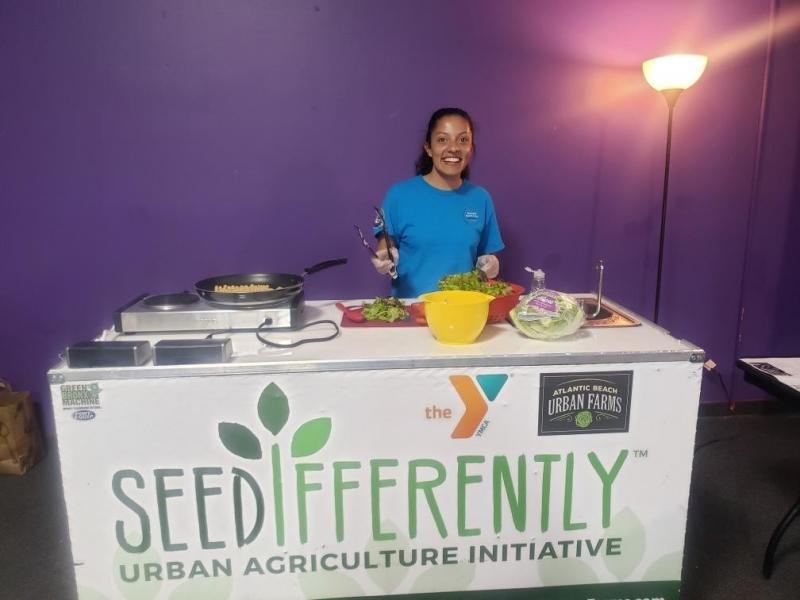Universal Languages - Art and Food
One of the most wonderful things in life is diversity. No human is the same; we all come from different backgrounds. With the waves of diverse cultures we see in the ‘melting pot’ we call the United States, we are fortunate to have exposure to many unique people. How do we get to know the stories behind these unique people? When language is a barrier, how do we learn more about our neighbors and where they come from? How do we do so in a way that the person feels comfortable sharing?

During my time serving with NHC, I’ve found the universal languages of art and food to be wonderful doorways to communicating with those from diverse backgrounds. Art can be seen around the world, with many traditional techniques being continued and shared globally. Food can tell the stories of one’s ancestors and where they come from, as the world sees all different types of foods and cooking techniques. Both art and food are great conversation starters to learn more about another’s culture. Reader, what is an art piece and/or meal that reminds you of home?

At the New American Welcome Center of the DuPont YMCA, my host site, we have cooking classes to share recipes and to learn about nutrition. I teach one cooking class a month to share meals that incorporate local produce. Most of the dishes I cook are somewhat common in the United States: A cauliflower taco with a side of cauliflower chickpea salad (cauliflower being our veggie of focus!). I have also invited some of the local new American attendees to host cooking classes and share their cuisine. Sharing recipes and cooking techniques from home opens the doorway to imagining life in a dining room across the world. In a recent cooking class focused on Syrian cuisine, students were able to see the importance of big family meals and picture walking to the market in Damascus to purchase certain staples like tahini. With a few sips of rich, aromatic coffee, students experienced a traditional coffee ceremony in an Ethiopian cooking class. Experiencing the different ingredients shows the importance of geography to one’s food culture as it often determines which ingredients are available. For example, Ethiopia, considered to be the birthplace of coffee, grows bountiful amounts of Coffea arabica which contributes to their popular coffee culture. Overall, the sharing of food recipes paved the way to communicate more about one’s story and background.
 During art classes at my host site, I’ve learned how a simple fabric can communicate where a person is from without using words. For example, a white fabric with small, unique accent patterns for a dress may show roots from Ethiopia whereas a vibrant dress made from a specific fabric pattern may show roots from Sudan. I am no expert in identifying where fabric patterns may originate from; however, communicating and learning about these fabric roots has opened the door to learning so much about how people from different countries in Africa identify with art. The same is true for all countries around the world as art is so important to culture and how one identifies. Art can also be therapeutic, comforting, and a good mental health practice. In a previous art class, women were asked to sew a square showing something they love or something that is special to them. These squares were woven into the quilt you see below. You can see how each square is so unique. All of these artists come from different parts of the world and may speak different languages, but they were able to communicate and share something that is special to them through art.
During art classes at my host site, I’ve learned how a simple fabric can communicate where a person is from without using words. For example, a white fabric with small, unique accent patterns for a dress may show roots from Ethiopia whereas a vibrant dress made from a specific fabric pattern may show roots from Sudan. I am no expert in identifying where fabric patterns may originate from; however, communicating and learning about these fabric roots has opened the door to learning so much about how people from different countries in Africa identify with art. The same is true for all countries around the world as art is so important to culture and how one identifies. Art can also be therapeutic, comforting, and a good mental health practice. In a previous art class, women were asked to sew a square showing something they love or something that is special to them. These squares were woven into the quilt you see below. You can see how each square is so unique. All of these artists come from different parts of the world and may speak different languages, but they were able to communicate and share something that is special to them through art.

Finding something, like art and food, that shows our uniqueness is a great way to communicate with people from different cultures. You never know where someone has come from or what they are comfortable sharing. However, starting the conversation with a ‘universal language’ can pave the way to building a trusting relationship while learning about their background.

This blog was authored by NHC Florida member Camille Saunders.
Camille serves at the DuPont YMCA as a Health Educator.